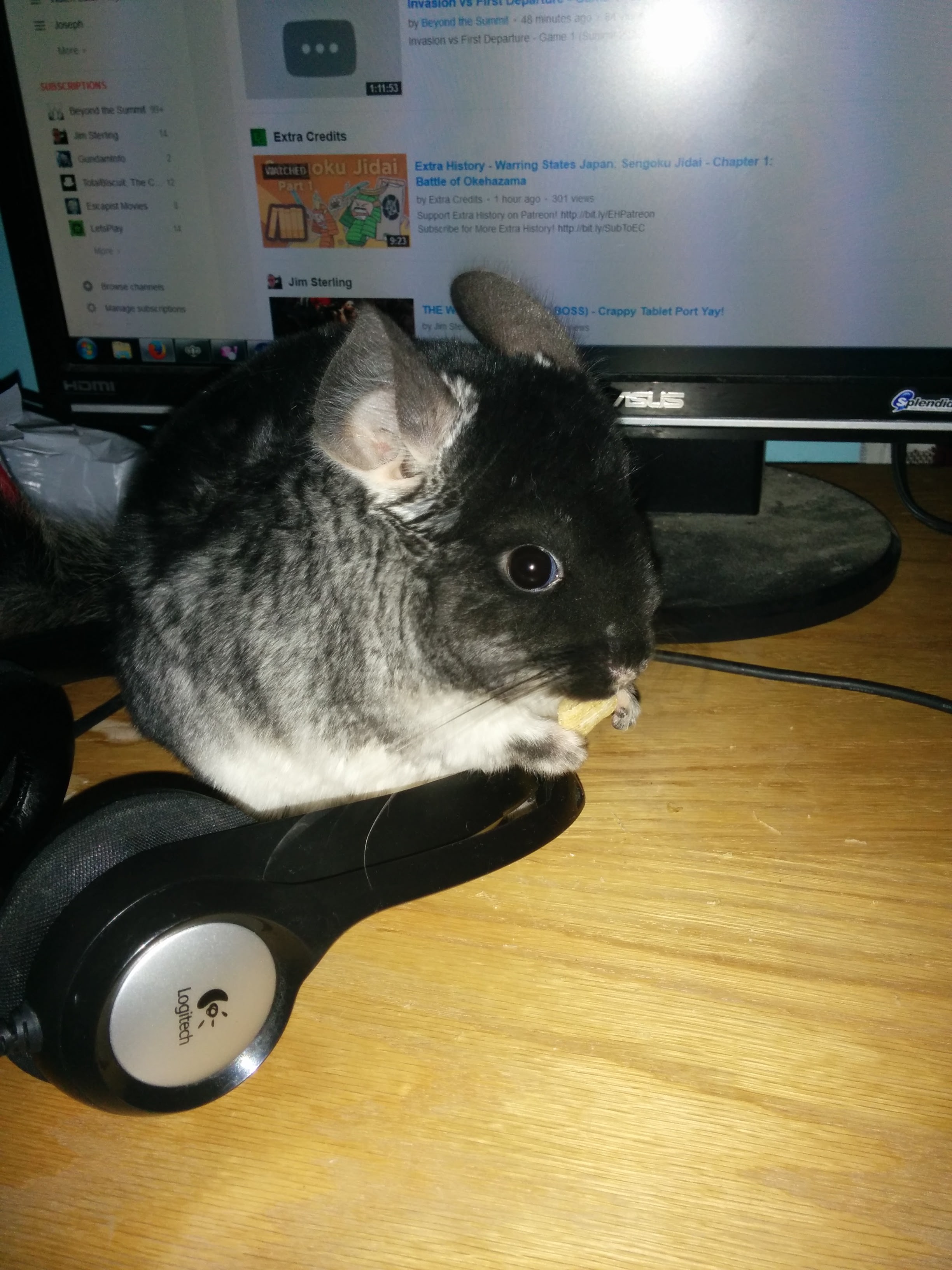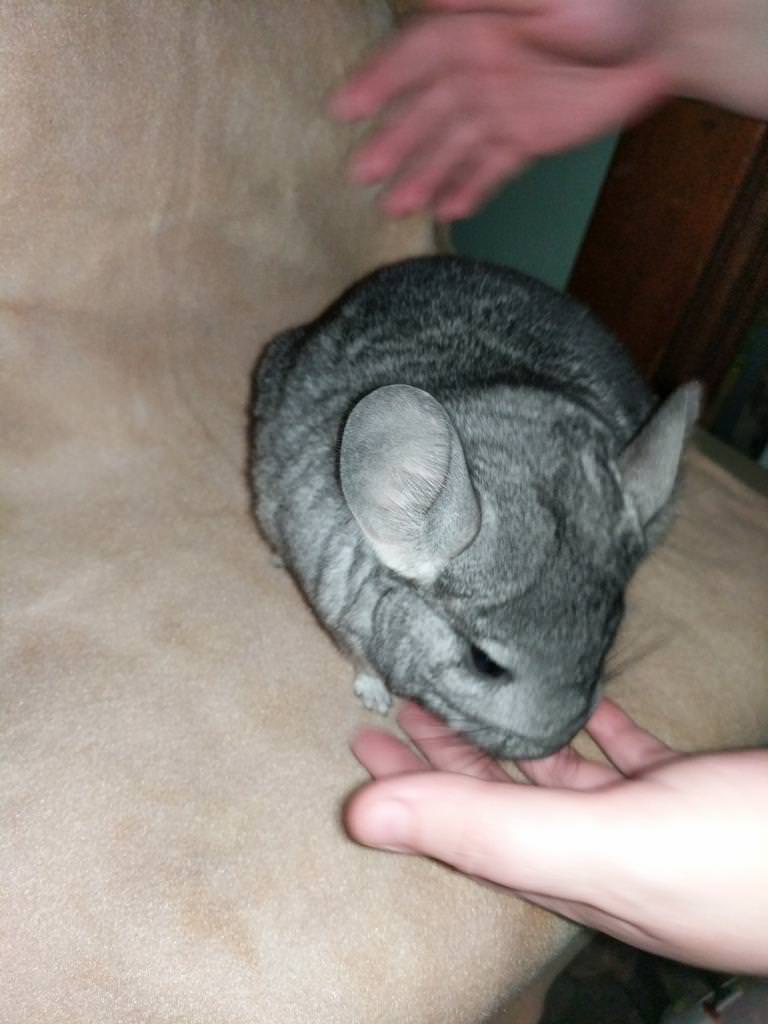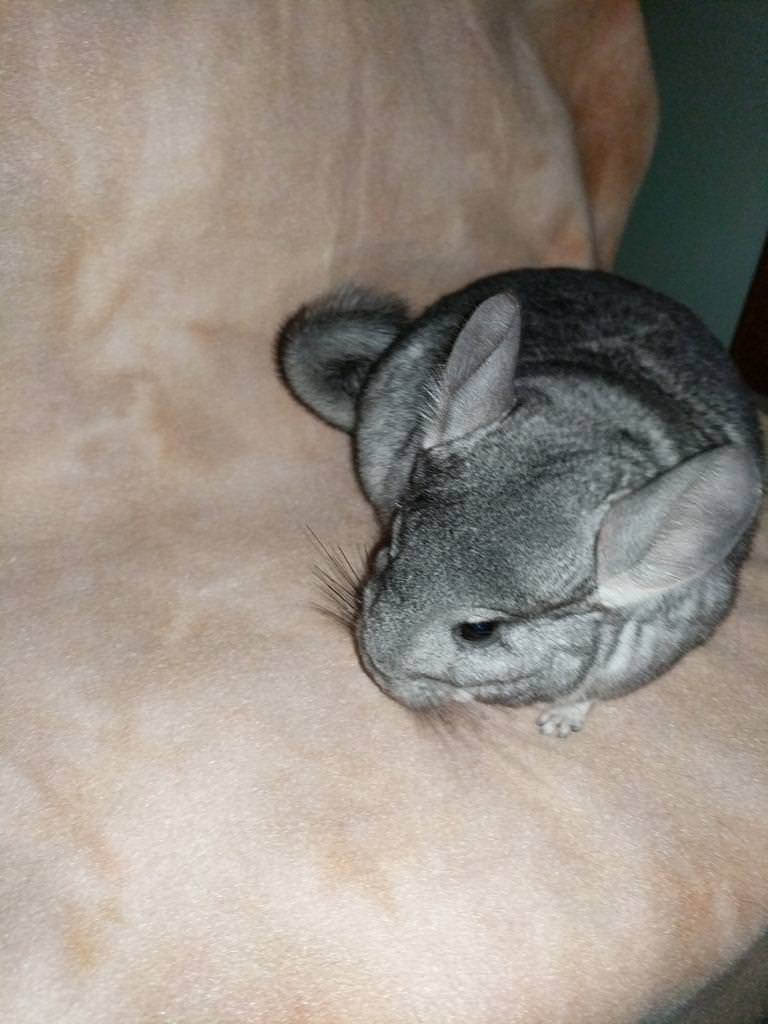It is a rare thing at all to happen and this past year has been a bit unlucky with what is probably only our 3rd lost kit in 5 years and our first stillborn litter. We actually have not lost an adult until now and we do not put down culls like with rabbits. There isn't much market for show quality locally and a few of the highly intelligent critters with big personalities and not a mean bone in their bodies have a bit too big of personality to be suitable for producing offspring that will mostly go as pets but we find them a more patient home than usual at half our usual price. Unfortunately one of our violet carriers we decided to keep, had just paired with a female, and I was debating what name to put on his pedigree had an accident.
The dogs knocked loose the lock on the wheels of the glass display cage and it rolled down the slant of the livingroom addition into the chinchilla cages. It's not really an issue because the cages are quite durable steel and the display cage has a steel frame protecting glass panels. What we didn't realize was that a light was left clipped to the top of the display cage and plugged in for seeing the cages better during cleaning. Being a chinchilla he had to chew the cord. We realized the mistake only when there was a bright flash and *pop*. Investigating my husband found the stiff chinchilla and said he could not pull the cord from it's mouth but it was breathing. I knew there really couldn't be a chance it would survive that. It was not one of our starting stock or first few we produced and kept but I rather liked that little velvet male. My husband said he got his dad's crazy hyperactivity and was difficult to handle but for me he'd hop out of the cage down my arm to my shoulder and then back again without causing any trouble so he won a breeding spot with a new female we brought in. My husband unplugged the extension cord from the wall and then I unplugged the light from it. He still couldn't get the cord out of it's mouth and it was still breathing but there was nothing to be done. It was beyond unconscious and I don't know what process was keeping it breathing so I told him to just wait for the muscles to relax. On the fraction of a percent chance it woke up we'd deal with any damage but likely it would just pass and go slack. Minutes later it was not breathing and after a half an hour I removed the cord and my husband removed the body. The darn chinchilla didn't waste any time and had grabbed right down in the middle of a wire to yank the center of it into his mouth in one bite.
It was not one of our starting stock or first few we produced and kept but I rather liked that little velvet male. My husband said he got his dad's crazy hyperactivity and was difficult to handle but for me he'd hop out of the cage down my arm to my shoulder and then back again without causing any trouble so he won a breeding spot with a new female we brought in. My husband unplugged the extension cord from the wall and then I unplugged the light from it. He still couldn't get the cord out of it's mouth and it was still breathing but there was nothing to be done. It was beyond unconscious and I don't know what process was keeping it breathing so I told him to just wait for the muscles to relax. On the fraction of a percent chance it woke up we'd deal with any damage but likely it would just pass and go slack. Minutes later it was not breathing and after a half an hour I removed the cord and my husband removed the body. The darn chinchilla didn't waste any time and had grabbed right down in the middle of a wire to yank the center of it into his mouth in one bite.
Is it hard for humans to deal with rapid death because we are taught to think of it as worse, that it's hard to process the loss, or is it an instinctual response to how dangerous the situation or event must be toward our own health and others? Logically I know he was probably unaware of anything the instant he bit down and the light popped. It probably knocked out any cognitive function or pain recognition as fast as a bullet but it still seems such a miserable way to have lost one.
I don't have a picture of that chinchilla specifically yet. His half sister is a velvet like him and my husband's favorite while his full sister may be only a standard grey but is a beautiful show quality example with the fluffiest fur and wonderful personality.



I will have to attempt to pair that female for the 3rd time. She was beaten up by her first mate attempt and was getting along well with this male despite his active personality.
The dogs knocked loose the lock on the wheels of the glass display cage and it rolled down the slant of the livingroom addition into the chinchilla cages. It's not really an issue because the cages are quite durable steel and the display cage has a steel frame protecting glass panels. What we didn't realize was that a light was left clipped to the top of the display cage and plugged in for seeing the cages better during cleaning. Being a chinchilla he had to chew the cord. We realized the mistake only when there was a bright flash and *pop*. Investigating my husband found the stiff chinchilla and said he could not pull the cord from it's mouth but it was breathing. I knew there really couldn't be a chance it would survive that.
Is it hard for humans to deal with rapid death because we are taught to think of it as worse, that it's hard to process the loss, or is it an instinctual response to how dangerous the situation or event must be toward our own health and others? Logically I know he was probably unaware of anything the instant he bit down and the light popped. It probably knocked out any cognitive function or pain recognition as fast as a bullet but it still seems such a miserable way to have lost one.
I don't have a picture of that chinchilla specifically yet. His half sister is a velvet like him and my husband's favorite while his full sister may be only a standard grey but is a beautiful show quality example with the fluffiest fur and wonderful personality.



I will have to attempt to pair that female for the 3rd time. She was beaten up by her first mate attempt and was getting along well with this male despite his active personality.



